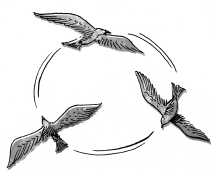
FROM THE NOTES OF GRANDPA ROSE
The sentence was for eleven years. The charges included conspiracy, bootlegging, and assaulting an officer. The sentence could have been worse. The police didn’t know about the bodies.
The prison was a squat tower in an inland city. Prisoner Thirty-Four, that was the name he was given there, the number sewn to the breast of his uniform. His cellmates included a murderer who snored, an arsonist who stuttered, and a seventy-nine-year-old bootlegger who was as toothless as a baby. Once a week, Ana drove the truck in from town to visit, brought baskets of homemade biscuits. Monte would share with the others, always: Since the bootlegger had trouble chewing, the murderer would carefully dampen a biscuit with water, then mash the biscuit with his fingers into bites the bootlegger could swallow. Their cell faced the sunrise, would flood with bright light every morning, waking everybody. One morning, though, the bootlegger never woke; the bootlegger had died, sometime during the night, curled into a humped ball. With stiff fingers the bootlegger was clutching a scrap of paper that read Arch Stanton. Nobody knew what the paper meant. Still, Monte considered the incident an omen. He wasn’t wrong there; his father died the very next day. That week Ana brought a flower with the biscuits, and cried. The murderer, who was especially sensitive, cried some too after he heard, and the arsonist said shucks. Monte himself though didn’t know what to do or say, so did and said exactly nothing.
Going to prison was like going to college. He learned about hijacking trucks, about printing counterfeits, about scamming bookies. He met prisoners who had come from other states, from other countries. He was promised various jobs after he had been freed.
The country was changing. The guards pored through comic books about superheroes, flipping past pictures with bright sound effects, kapows, zwaps, bloofs, fwaks, speech balloons that captured voices. The economy had collapsed and recovered, villages of shanties had been set up and torn down, farms had been deserted and bridges erected, all somewhere beyond his barred window. Prohibition had ended years ago: Selling liquor wasn’t illegal anymore. But there were plenty of things that still were; there were always things to smuggle.
Here, this here, is something he remembers: a memory of leaving prison, pockets loaded with returned possessions, the day he became an ex-con. The sun flaring, the seagulls wheeling overhead, the truck waiting beyond the fence. She was humming a jingle. She was wearing that light blue dress. She drove the truck back to the village, winding through the trees along the lakeshore, honking at the children leaping from rope swings into the waves. Ana was renting a cottage across from the storehouse. The world was at war again. America wasn’t, yet.
He shaved, bathed, ate three eggs. He drove her to the orchard where she worked picking apples. Then he drove to the house his father had built.
The house looked the same. The roof was coated with leaves. A family was eating popcorn on the porch. The father had a pitted face. The mother wore a patterned dress, had a wooden leg attached to a knee stump, was gathering popcorn the children had spilled.
He had been told his father had died. But that was the moment he understood his father actually was dead; on the porch his father had built, strangers were eating popcorn.
He had sworn he hated his father. As a kid he had needed somebody to blame. The voice went like this: Why didn’t you drown, instead of my mother? Seeing those strangers eating popcorn on the porch, though, all at once, all of that hate became love. He has a memory of that feeling. He didn’t have to pretend to hate his father anymore. He didn’t have to blame his father for anything. He was thirty-one years old.
Seated in the truck, still watching the family, he slipped the music box from his coat and wound the crank. That song had the power to wake his father from even the deepest slumber. But the crank wound down, and the music stopped playing, and his father was still dead. Monte did not like crying; after that he carried the music box with him everywhere, and never let himself listen to the song again.
Later that afternoon the family drove away wearing swimsuits and beach towels. Monte broke into the house. He dragged the bathtub away from the window, popped the floorboards. The other heirlooms were still there. The clock still ticking, the bellows still breathing. Monte carried the heirlooms to the truck. Still hanging from a hook in the shed he found the thick ring of iron keys the smugglers had given him. Monte carried the keys to the truck. He shut the window he had forced open. He hadn’t bothered shoving the bathtub back where the bathtub belonged.
He broke into the house again a week before being married, sat in the kitchen, staring at nothing. He broke into the house again a day after becoming a father, sat on the fireplace, staring at nothing. He kept breaking into the house, between smuggling jobs, whenever he came home from troublemaking, just to sit there in the quiet and to stare at everything and to remember.
Rumors that the house is haunted—that the families that lived there were driven away by a ghost—may have begun then.
The bathtub moved, the chairs drifted, handprints formed in the fireplace’s soot.
There was a ghost.
Monte.